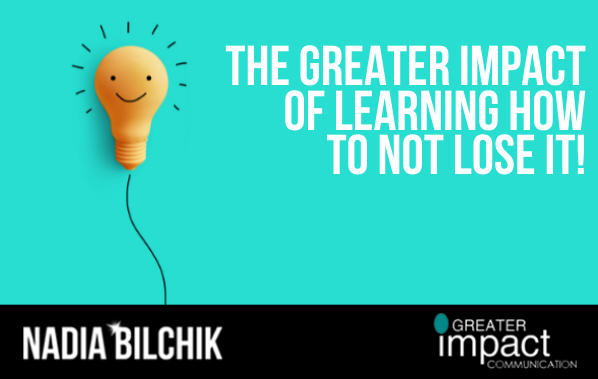
If you have ever attended a Greater Impact Workshop you will have heard the phrase that EVERYTHING you do and say communicates. The way you are perceived is the culmination of many factors. Key amongst these is your ability to relate to others in the most effective, powerful and gracious way. And even more revealing is how you navigate the inevitable interpersonal conflicts that arise in the workplace from time to time.
Not surprisingly, handling and defusing interpersonal conflicts in the workplace is immensely challenging for various reasons. Firstly, you may be able to choose your friends, but you are generally not in charge of selecting who will be your colleague or boss. When a co-worker behaves in a way that upsets or hurts you, you can’t necessarily walk away in the hopes that you will never have to deal with him or her again. Secondly, even though emotions can run high, particularly if you feel you are being unfairly singled out or criticized, the open expression of negative emotions – otherwise known as yelling and screaming, rolling eyes, or pounding fists – is frankly not acceptable in most work environments.
So take a moment and think about the last time you experienced a situation where you disagreed with someone, or someone did something that you perceived as irritating, upsetting or insensitive. How did you handle it, and what was the outcome?
Did you resolve the conflict amicably and find resolution? Or did it end in further conflict and alienation? The fact is that 99% of the time we have a choice to either be a problem solver or a problem exacerbater. The challenge is to strive to become the former in such a way that you can accomplish at least three things: defuse the conflict, find a constructive solution, and maintain your self-respect. This helps build your reputation as a problem solver and someone who others want to work with. Indeed, as Robert Frost has written: “You are educated when you have the ability to listen to almost anything without losing your temper and/or self-confidence.”
The first step is to literally take a step – backwards. Don’t immediately react: rather, employ that tried and true calming measure of taking a deep breath and “counting to ten”; then, if you can wait a day before responding, even better. This does not mean you should completely avoid the problem and hope it will go away. Conflicts that are not addressed are likely to fester and cause long-term problems. Rather, use the time to do as Stephen Covey says in the Seven Habits of Highly Effective People, “seek first to understand before being understood ” and try to analyze the source of the problem. The source of the conflict might not even be an interpersonal issue. According to Alice Fuscaldo, the employee relations and training specialist for IEEE Human Resources, in Piscataway, N.J., sometimes conflicts arise from a scarcity of time, money, workers, supplies, or other resources. Or there might be a communication problem, especially when your colleagues don’t understand exactly what is required of them, or vice versa.
Be honest with yourself: If you are one of those people who consistently experience conflict and tension from job to job, our advice is often to evaluate the common denominators, which may involve taking a tough look in the mirror. Simply stated, be open to the possibility that the source of the conflicts quite possibly may be you.
An extremely useful strategy is to always live by the tenet of ASSUMING POSITIVE INTENT. In essence instead of immediately getting angry or making an assumption about where the other person is coming from, take a moment and try and see the situation from his or her perspective, and go from the assumption that this individual really intends to “do the right thing.” This can be counter-intuitive because as human beings we instinctively defend ourselves, and if we perceive we are being attacked, our defense can come across as aggressive.
The person who is causing your distress will very often be disarmed by your conciliatory attitude. Most people expect an aggressive response because they are ready for a fight, but if you respond with an “I am so sorry, there seems to be some misunderstanding here…help me understand how we can resolve this?” you will be amazed at their reaction. Keep in mind that this is not a case of “wimping out”; rather, you will be responding from a position of strength, not weakness, in that you are the one has made a conscious choice to seek constructive solutions rather than win a war. The alternative is staying in a mode of conflict and being viewed as less productive, polished and accomplished than you really are.
You always have a choice. The war you are winning is one of your self image, and being seen as a collaborator and problem solver is so powerful in the overall trajectory of your career.
Personality issues such as ego, selfishness, or personal differences often also play an important role in work conflicts. Consequently, in the important quest of “keeping your cool” you will find it very helpful if you can develop the ability to see the world from the other person’s point of view. We often make an assumption that everyone sees things the way you to, rather than taking into account that people from different backgrounds and with different personality styles handle situations differently. This is where developing Emotional Intelligence, otherwise known as your EQ, becomes important for both your survival and success in any environment.
Firstly, most people have a tendency to connect immediately with people who have a similar disposition to themselves. But your work colleagues are not usually your friends, so if you are an outgoing extrovert, you may find it a challenge to negotiate with quieter, more reserved people. Equally if you are very social and people orientated, a co-worker, who is totally focused on work and getting the job done may at first appear cold and uninterested in the emotional dimensions of an issue.
It is in these moments of judgment that you have to remind yourself that differences in personality style, although not always obvious at first, can be a vast as divisive as differences in age, background and culture. You also need to take a careful look at yourself: What kind of personality do you bring to the table? Do you respond defensively to criticism and have a need to always be right? Are you always in a hurry to get the job done? Do you find it hard to wait while other people catch up with your understanding of the issue and the approach you would like to take?
Dr Tony Alessandro, a seasoned marketing and presentation guru, points out that it is only by understanding the nuances through which other individuals see the world, that we can begin to relate to them in a meaningful way. When you treat people the way YOU want to be treated, you create relationship tension. When you treat people the way THEY want to be treated you build RAPPORT.
Your ability to build rapport and relate to as many personality styles as possible is one of the most valuable qualities you can possess. To learn to do this, it is important to learn how to read your work colleagues’ verbal, vocal (voice inflection) and visual signals and then adapt your behavior to accommodate their behavioral style.
Dr. Allesandro has identified four basic personality styles, Director, Socializers, Relaters and Thinkers. The Director, for example is results orientated, decisive and direct, while the Thinker is careful, detailed and reserved. The Relater is likely to be friendly and avoid conflict, while the Socializer is enthusiastic and creative.
Dr. Allesandro suggests using a range of strategies to communicate effectively with people of different personalities, particularly in the case of conflict situations. For the Director, it is important to focus on results, give direct answers, and lower your expectations for an empathetic response to your particular issue.
The Thinker prefers to be given as many details as possible, and appreciates time to gather information and decide on solutions. In a conflict situation, this person will need time to think over the issue at hand before responding. The Socializer is not a detail person, and appreciates freedom to plan and accomplish his or her work. And the Relater values expressions of appreciation and support.
We obviously resonate and connect more with some people than others. Each and every one of us relates to people differently depending on our own personality style. Some of us are very open and share personal details quickly. Others are more reserved and would never think of discussing our personal lives on first meeting. There are those people who leave a meeting having noticed the tension that existed between two colleagues, and there are those so focused on the task at hand that this went by unnoticed.
To relate to people more successfully, and resolve conflicts and disagreements if they arise, it is important to learn how to read your co-workers’ verbal, vocal (voice inflections), and visual signals, and then adapt your behavior to accommodate their behavioral style. Some individuals find it easy to converse with strangers and will quickly share relatively personal information. Others are more reserved and may need time to feel comfortable in a new social situation before opening up. The more open person would probably enjoy a personal interaction that is warm, lively and open, and, and in the case of conflicts and disagreements, will probably be more open to honest discussions of the issue. On the other hand, a more reserved individual is likely to shut down and “head for the hills” if approached too quickly, and is very likely to “shut down” when conflicts arise. This kind of individual will need time to think over the issue, and would probably respond well to a low-key, non-confrontational effort to solve the problem at hand. In addition, the “socializer” would probably respond positively to a “face-to-face” discussion of a contentious issue, while the more reserved individual is likely to be more comfortable if you communicate with him or her by e-mail or text.
Individuals with different personality characteristics also prefer different kinds of communication styles. For example, people who have strong leadership qualities usually appreciate direct, results-oriented communication. A creative type, on the other hand, might respond well to communication that refers to his or her field of interest. This kind of individual may not be interested in details, but will appreciate being given time to plan and accomplish his or her own work.
Meanwhile, an introverted, detail-oriented individual is not likely to respond well to overenthusiastic behavior that he or she feels is impinging on his or her personal space. This kind of personality will probably prefer to be given as many details as possible, and appreciates time to gather information and decide on solutions.
Some people value interpersonal relationships, while others are more comfortable as “loners.” While a person who is invested in interpersonal relationships may value expressions of appreciation and support, and be relatively comfortable dealing with interpersonal conflicts and disagreements, a “loner” may feel uncomfortable in that kind of situation, and prefer a certain distance.
To summarize, if you can develop the interpersonal skills to keep your cool and handle difficult interpersonal situations with grace and power, you will have met one of the most important challenges of attaining the kind of Professional Presence. Remember, the best way to disarm a conflict is to ASSUME POSITIVE INTENT and refuse to go to war.
This will truly give you an EDGE, both in the workplace and in your personal life as well.
E-evaluate every situation assuming positive intent
D – Do unto others as they would have done unto them
G – gracious, conciliatory behavior will get you everywhere
E-evaluate and respect personality styles.
Overcome Nerves and Develop Confidence
The Greater Impact of Understanding the PAIN Factor
The Greater Impact of Overcoming Self Doubt



